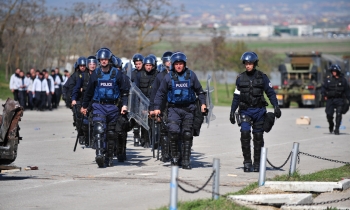What prompted me to write this article was an item on the BBC website that exemplified all that is fundamentally wrong with the corporation’s coverage of the Arab-Israeli conflict.
The item, entitled "Settlers move into east Jerusalem" from March 31 this year, describes "angry demonstrators", "clashes between local Palestinians and police", and "angry Palestinians throwing stones at the new arrivals". As usual, the BBC reported that "security" forces "responded" with teargas.
The fact that east Jerusalem is militarily occupied by Israel in contravention of international law, and that the settlers’ presence in that part of the city and other Arab territories violates the Geneva Conventions and several binding UN Security Council resolutions, would have given vital context to the Palestinian reaction.
But such context was totally absent. The article spoke merely of Palestinians wanting east Jerusalem to be the capital of their future state, of "an Arab-dominated area of east Jerusalem", and "unauthorised" and "illegal outposts" in the West Bank (those deemed so by Israel) whose removal is required under "the US-backed Middle East peace plan".
Instead of reporting that all Israel’s settlements are illegal under international law and must be removed, the BBC treated its readers to five paragraphs of justification by a settler spokesman, who said they "returned with the idea of living side-by-side with the Arabs" and that they coordinated with the police to have "less antagonism". Contrast this with just two paragraphs given to a Palestinian man whose house had been taken away by force to accommodate the settlers.
Members of Arab Media Watch (AMW), myself included, have monitored the BBC for some time, and the flaws evident in the above-mentioned article - namely regarding settlements and the occupation - are, sadly, consistent with its coverage of the Arab-Israeli conflict in general, and prompted me to study its website's output for the first quarter of 2004.
Settlements
During this period, just one article regarding Israel’s settlements, by Kathryn Westcott on March 31, stated unequivocally their illegality: "Jewish settlements, themselves, contravene international humanitarian law, which prohibits an occupying power transferring citizens from its own territory to occupied territory. (This is laid down in the Fourth Geneva Convention, article 49.)"
Fewer than one in 10 articles regarding settlements reported that they are "considered" illegal, but this choice of verb is inadequate, as if to imply that the issue is open to debate. Theft is illegal. It is not open to "consideration".
So some 90% of relevant articles failed completely to mention international law. One article simply reported on February 17 that "Israeli housing Minister Effi Eitam said he would propose new laws to make it illegal to evacuate settlers and dismantle their homes"! Furthermore, the article contained more pro-settler sources than anti-settler sources, and the former were given more space.
This was a predominant trend, even among articles that referred to the "considered" illegality of settlements. Those included an article by James Rodgers on January 30, which gave more space to the views of Gaza settler spokesman Eran Sternberg than those of Barjas al-Waheidi, who has been a refugee since 1948. The headline of another article by Rodgers, dated February 26, said it all: "Gaza settlers hoping to stay put". The article was almost completely from the settlers’ point of view, with no Palestinian sources. The caption of one of the pictures read: "Dismantling the settlements will cause massive upheaval for thousands."
There were also no Palestinian sources in a February 7 article by Matt Prodger about a settler beauty contest in the West Bank. He gave the Israeli viewpoint greater space in another article dated March 7.
This was also the case with an article entitled "Sharon orders Gaza pullout plan", in which there were five Israeli sources (Prime Minister and settler champion Ariel Sharon, Foreign Minister Silvan Shalom, Likud member and pro-settler Yechiel Hazan, settler spokesman Shaul Goldstein and settler leaders quoted in Israeli newspaper Maariv) compared to just one Palestinian source who was given far less space.
Of the above-mentioned articles, half contained pictures of settler babies, children, teenage girls and mothers. Only one contained a picture which could be deemed sympathetic to the Palestinians - a woman on a stretcher - though the caption lacks any context: "There has been an increase of violence recently".
So during the first quarter of 2004, the BBC website reported the issue of settlements almost totally without reference to their illegality or to the fact that they are built on occupied Arab land, and gave the viewpoint of the colonisers greater space than those of the dispossessed.
Occupation
The occupation in general fares no better. Fewer than one in five articles referred to the occupation of the Palestinian territories, but if one counts only references from the BBC rather than its sources, this figure falls to less than one in 10 articles. In some instances where the occupation is mentioned, it is portrayed as a Palestinian, Arab or Muslim perception, rather than an unquestioned reality.
For example, BBC News Online world affairs correspondent Paul Reynolds wrote in February: "The Palestinians argue that all the land captured by Israel in the 1967 war is occupied territory Israel rejects the claim that the land it captured in 1967 is occupied territory."
Following Israel’s assassination in March of Hamas spiritual leader Sheikh Ahmed Yassin, security correspondent Frank Gardner wrote: "For most Arabs and Muslims, the Hamas movement was one of national liberation from occupation, that’s how they perceive it, they don’t see it as a terrorist movement in the way that the West does."
Only around 10% of articles on the Israeli-Syrian conflict mentioned the occupation of the Golan Heights.
Regarding the Israeli-Lebanese conflict, some 20% of articles mentioned the 22-year occupation of south Lebanon, but again this figure is almost halved when only counting references from the BBC rather than its sources. An article by Reynolds talks of "the Israeli departure from its security or occupation zone in 2000", as if reference to the occupation is merely subjective or justified on security grounds.
This is nothing new. The BBC often uses maps of Lebanon describing the area occupied by Israel as "former Israeli security zones". I doubt the BBC would describe northern Israel as a "Lebanese security zone" if the Lebanese army invaded and occupied it.
This reminds me of an astonishing e-mail AMW deputy chairman Ben Counsell received from BBC Online last August after complaining about the term "security fence": "We feel we are right to use the term security fence’ as this is what Israel is calling it"!
So on average BBC Online mentions occupation - a core issue of the Arab-Israeli conflict - in only one in 10 articles. In addition, AMW director Judith Brown, who did a thorough study of Today - one of BBC Radio 4’s flagship programmes - covering December 2003 to the end of February 2004, found that the occupation "was not mentioned by any BBC reporter or presenter during the whole of this period, although it was occasionally mentioned by British spokesmen who were interviewed."
A letter I received in January this year by Fraser Steel, the BBC’s head of Programme Complaints, raised my concerns that perhaps the corporation’s widespread omission of the "o" word is no accident. I had complained about "Terror Tourists", a one-hour documentary, shown on BBC 2 last December, about armed American "tourists" patrolling Palestinian streets with armed Israelis, and without a single Palestinian approached for their opinion, save for a few words from the Palestinian Authority during the closing seconds of the programme.
Part of my complaint read: "The occupied Arab territories were described more than once as disputed’ by (producer Tim) Tate, who allowed those on the programme to claim without challenge that those lands do not belong to its rightful, sovereign owners.
"This ignores their internationally recognised status as Arab lands, as well as numerous binding UN Security Council resolutions describing Israel as an occupying power whose occupation policies have no legal validity’ (Resolution 465) and are null and void and without international legal effect’ (Resolution 497). Resolutions 471 and 476 reaffirm the overriding necessity to end the prolonged occupation of Arab territories occupied by Israel since 1967, including Jerusalem’."
Steel sent me a four-page defence of the programme, but his following words particularly alarmed me: " it is not unreasonable to use the word disputed’." This from a senior BBC figure in charge of programme complaints!
Resistance
Naturally, if occupation is seldom mentioned by the BBC, neither is resistance to it. In the first quarter of 2004, the corporation's website itself referred to such resistance only four times - three times regarding the Palestinians and once regarding Lebanon - all in March. In fact, BBC Online talked of resistance three times during that period when referring to the removal of settlers.
So in the vast majority of cases, the BBC’s audience is told only of suicide bombings, "militants", "violence" and "attacks," without any cause or context.
Context
Contrast the background information provided after suicide bombings with that of Israel’s occupation policies. When a suicide bombing occurs, BBC Online offers a chronology. I asked last September if such chronologies existed for Israeli assassinations, house demolitions, settlement construction, Palestinian civilians killed etc. World editor Steve Hermann admitted: "We do not have a single Palestinian timeline equivalent to the Israel suicide bomb blasts."
But he attempted to justify this: "We report the things you mention in our news coverage and focus on them in detail in the feature and background stories we do. We are not attempting to suggest that the Israel bombings are more worthy of being reported, it is simply that we do not currently feel it is justified to reduce all the violence suffered by Palestinians to a simple list and report the violence in these terms."
I told him I was unconvinced by his arguments: "Your reason for not having timelines for Palestinian suffering is because you report it in your regular news coverage. However, you do the same with suicide bombings while also having a timeline for them. This hardly seems balanced.
"As a journalist like yourself, I recognise the usefulness of having timelines, as they provide perspective and trends to events and actions that may otherwise seem fragmented and complicated.
"You say that you don’t want to simplify’ Palestinian suffering by having timelines, but I would argue that people need such simplification. Otherwise, they will view Israel’s assassinations, house demolitions, settlement activity etc. as being isolated events rather than long-term, frequent policies. For instance, having looked at the timeline of Israel’s suicide bombings, one could refer to similar timelines for Palestinian suffering to see what happened between each suicide bombing. This is not to excuse suicide bombings, but to give a sense of perspective.
"If one were being cynical, one would view this as a lack of balance or even lazy journalism, as these injustices far outnumber suicide bombings and would thus take more time to compile. This is all the more reason why they should be compiled in such a way."
His response seemed to acknowledge the far more numerous injustices inflicted on the Palestinians, but he would not budge. "To create and maintain a timeline of casualties overall would be an almost insurmountable task and would also lack a clear editorial focus," he said. "Suicide bombings are a shocking if sadly familiar part of the Middle East conflict and they tend to make headline news when they happen." Since the BBC decides what makes headline news, is he implying that the corporation simply deems suicide bombings more newsworthy?









